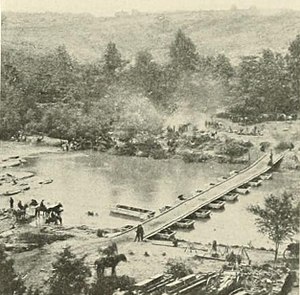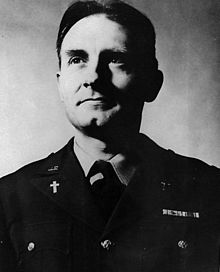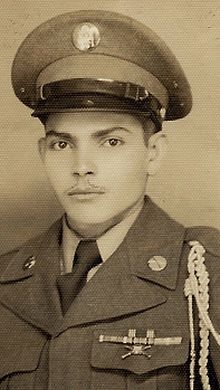*1862, Sgt. William Taylor - Northern butts whipped by Confederate troops under the command of Major General Thomas J. "Stonewall" Jackson at the Battle of Front Royale in Virginia, Taylor prevents the defeat from being worse (the Union takes almost 773 casualties to only 36 for Jackson's command) by ignoring his wounds, and in the face of charging cavalry, destroying a critical bridge over the Shenandoah River.
Battle of Front Royal - Note Bridge In Background
*1863, Sgt. Andrew S. Byrant - In command of a 16-man guard force, holds the bridge at New Bern, North Carolina, beating off 30 minutes of Confederate attacks, and preventing capture of the city.
Byrant
*1864, Captain Jonathan C. Kirk - In Virginia, at the Battle of North Anna, Kirk single-handedly captures 13 Confederate soldiers.

Pontoon Bridge Over The North Anna
*1872, First Sgt. Richard Barrett - At Sycamore Canyon in Arizona, Barrett volunteers to lead a charge against a group of renegade Tonto Apaches.
Sycamore Canyon
*1939, Chief Machinist Mate William Badders - Senior member of the rescue team (and later, salvage team), who at risk of his own life, uses the newly created McCann Rescue Chamber of Lt. Commander Charles "Swede" Momsen to rescue 33 sailors from the submarine (26 drown in the accident), USS Squalus, when the vessel floods during a series of test dives and goes to the bottom of the Atlantic Ocean (246 feet below the surface, off the coast of Portsmouth, New Hampshire).
Badders
Rescue Chamber

Raised, And Renamed The USS Sailfish
*1939, Chief Boatswain's Mate Orson L. Crandall - One of Badders' team ... for his efforts rescuing the men of the USS Squalus, and later, helping salvage the submarine.

*1939, Chief Metalsmith James H. McDonald - One of Badders' team ... for his efforts rescuing the men of the USS Squalus, and later, helping salvage the submarine.

McDonald
*1939, Torpedoman First Class John Mihalowski - One of Badders' team ... for his efforts rescuing the men of the USS Squalus, and later, helping salvage the submarine.

Milhalowski
*1944, Tech. Sgt. Van T. Barfoot - During a scout of enemy lines near the Italian town of Carano, Barfoot advances alone through a German minefield, destroys a machine gun position with a hand grenade, wipes out a second machine gun (and captures three enemy soldiers), reaches a third gun and has its whole crew surrender, along with support elements, seventeen soldiers ... and kills eight more that don't feel like giving up ... later in the day, he disables a German tank with a bazooka, destroys an abandoned German artillery piece, and helps two wounded Americans back to safety.

Barfoot - 1944
*1944, Tech. Sgt. Ernest H. Dervishian - On an aggressive patrol (with four other men) near Cisterna, Italy, Dervishian forces 10 German soldiers to surrender, then captures another 15 men, captives sent back to command, he and the patrol attack a nine man unit fleeing the area, killing three and making six prisoners, using his carbine and grenades, takes out a machine gun position (and gains four more prisoners), uses the enemy gun to silence another German machine gun, while firing at a different position with a machine pistol, grabs ten more soldiers that want no part of fighting the sergeant, then, instead of withdrawing with the rest of the patrol, he grabs another abandoned machine pistol and goes after the last German machine gun in the area, and captures six more Germans.

Dervishian
*1944, Private First Class John W. Dutko - Outside of Ponte Rotto, Italy, Dutko launches a one-man attack on three German machine guns and a 88mm mobile field gun ... dashing forward, from 30 yards away he takes out the first machine gun with a grenade (and is wounded by the second machine gun), firing a BAR (the Browning Automatic Rifle favored by outlaw Clyde Barrow for cop killings) from the hip, kills the 88's crew, wheels on the machine gun that hit him, and kills its crew, is hit a second time by the third German gun, and kills that crew as he hobbles forward, dropping dead in the machine gun nest he has just eliminated.
Dutko
*1944, 2nd Lieutenant Thomas W. Fowler - Scouting ahead on foot near Carano, Italy, though a tank officer, Fowler discovers two disorganized infantry platoons held up by a German minefield and takes over ... lifting mines by hand, Fowler clears a 75-yard path through the field, then squad by squad, leads the platoons across, then, he leads the tanks through ... still ahead of everyone else (300 yards or so), he kills and captures a number of Germans in their dugouts ... Germans counterattacking with Mark VI tanks, when one of the American tanks is hit and catches fire, Fowler runs to it, and for 30 minutes, fires on enemy infantry and gives medical assistance to nine wounded Americans.
Fowler
*1944, Staff Sgt. George J. Hall - Pinned down by three machine guns and sniper fire near Anzio, Italy, Hall volunteers to eliminate the problems and crawls forward ... the first gun he takes out with grenades, killing two men and taking four captive, the second he removes using German potato-masher grenades he discovers (killing five more enemy soldiers, and capturing another five) ... moving on the third German gun, an enemy shellburst pulps Hall's leg so badly, that to apply a tourniquet, using a bayonet, Hall self amputates his own leg, while because of his actions, his unit is able to maneuver and takes the third German gun from the flank with no further casualties. Sadly, Hall never gets over his wounded leg, and dies from complications to his injuries in February of 1946 at the age of 25.
Hall
*1944, Private First Class Patrick L. Kessler - Near Ponte Rotto, Italy, acting without orders, Kessler moves 100 yards through machine gun fire to eliminate a German gun he has seen kill five men in his unit ... reaching the weapon, he kills two soldiers, captures a third after winning a hand-to-hand battle, and wounds a fourth German that manages to escape ... then he goes after another position that has just killed two more Americans (ten in all), eliminating the position by crawling forward 75 yards (part of it through a minefield), and from 50 yards away, dueling the strong point with his BAR, before finally walking forward, firing from the hip, and destroying the position ... while taking 13 Germans prisoner ... returning to his lines with his captives, Kessler is fired on from 100 yards away by two snipers (not very good shots), and after forcing his captives to stay put, engages the snipers with his BAR, and gets close enough to his opponents to turn them into prisoners too. Sadly, only two days later the gallant 22-year-old is killed while once more engaging German infantry in a gunfight.
Kessler
*1944, Private First Class Henry Schauer - Near Cisternia di Littoria, Italy, Schauer becomes a BAR ace when four snipers open up on his platoon ... exposing himself to fire, Schauer stands, and with four bursts from his weapon, each directed to different distances, kills all four men, takes out a fifth sniper as the man readies to fire on Schauer's unit from behind a rooftop chimney, takes out a machine gun from 60 yards away, then kills the men that rush to take over firing the weapon. Putting a fresh magazine of ammo in the BAR, Schauer then takes out another German machine gun with a burst of bullets from 500 yards away.
Schauer
*1945, Staff Sgt. John C. Sjogren - Attacking Japanese positions near San Jose Hacienda on the Philippine island of Negros, leads his squad forward, but when he sees his next in command hit, moves across twenty yards of bullet riddled terrain to provide the soldier with medical assistance, that done, he kills eight Japanese in spider holes defending a pillbox, then starts throwing grenades into the position ... position eliminated, he then does the same thing ... eight more times ... by the end of the day, Sjogren has taken out nine enemy pillboxes, and killed 43 enemy soldiers.
Sjogren
*1951, Chaplain Emil J. Kapaun - The ninth American military chaplain to receive the Congressional Medal of Honor, when Kapaun is captured by the Chinese in North Korea during the Battle of Unsan, Kapaun becomes a source of hope for fellow prisoners ... carrying wounded men despite being ordered not to, digging latrines, mediating prisoner disagreements, giving away his own food, stealing coffee and tea, and smuggling into the prison compound dysentery medicine. Ground down, after leading an Easter sunrise service, Kapaun is taken to a "medical" facility where he is left alone to die ... which he does, perishing from malnutrition and pneumonia at the age of 35 (a total of 12 American chaplains will die during the war).

Kapaun

Kapaun Celebrating Mass In The Field - 1950
*1951, Private Demensio Rivera - Attacked by a large enemy force at Changyongni, Korea, 18-year-old Rivera fights back with accurate rifle fire until the weapon jams, then continues on using a pistol and grenades, and finally, his fists and a knife ... overrun, down to his final grenade, Rivera pulls the pin on the explosive and waits to release the device until enemy soldiers enter his bunker, knowing full well he will also probably be killed ... grenade detonated, four enemy soldiers are mortally mangled in the explosion, and although gravely wounded, Rivera survives (he will die in New York City in 1967 at the age of 33).

Rivera
No comments:
Post a Comment